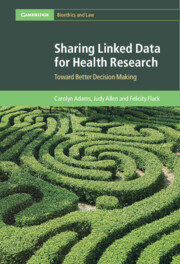Book contents
- Sharing Linked Data for Health Research
- Cambridge Bioethics and Law
- Sharing Linked Data for Health Research
- Copyright page
- Epigraph
- Contents
- Figures
- Tables
- Foreword
- Acknowledgements
- Abbreviations
- Introduction
- Part I Context for Decision Making
- Part II Frameworks for Decision Making
- Part III Practice and Process of Decision Making
- 7 Existing Practice and Processes
- 8 Better Practice and Processes
- Glossary
- Index
- Cambridge Bioethics and Law
8 - Better Practice and Processes
from Part III - Practice and Process of Decision Making
Published online by Cambridge University Press: 02 June 2022
- Sharing Linked Data for Health Research
- Cambridge Bioethics and Law
- Sharing Linked Data for Health Research
- Copyright page
- Epigraph
- Contents
- Figures
- Tables
- Foreword
- Acknowledgements
- Abbreviations
- Introduction
- Part I Context for Decision Making
- Part II Frameworks for Decision Making
- Part III Practice and Process of Decision Making
- 7 Existing Practice and Processes
- 8 Better Practice and Processes
- Glossary
- Index
- Cambridge Bioethics and Law
Summary
Chapter 8 concludes the book by proposing ways to improve decision-making in relation to sharing linked data for research. It considers improvements in a number of areas: the decision-making framework of interests, values, and rights; the decision-making criteria and conditions; the decision makers who are best placed to make each decision; and the decision-making process. The chapter sets out the interests, values and rights that should frame decisions in this sphere, not all of which are currently represented in decision-making frameworks. It provides a list of decision-making criteria and considerations that should be taken into consideration by the relevant decision makers. The chapter distinguishes between ethical decisions, which should be made by ethics committees and governance decisions, which should be made data custodians. Finally, the chapter makes recommendations for a decision-making process that will be efficient, transparent, accountable and collaborative. This process is designed to lead to better decisions and to ensure that both the decision-making process and the decisions themselves develop and sustain the social licence needed to support the important enterprise of research using linked data.
Keywords
- Type
- Chapter
- Information
- Sharing Linked Data for Health ResearchToward Better Decision Making, pp. 206 - 240Publisher: Cambridge University PressPrint publication year: 2022



